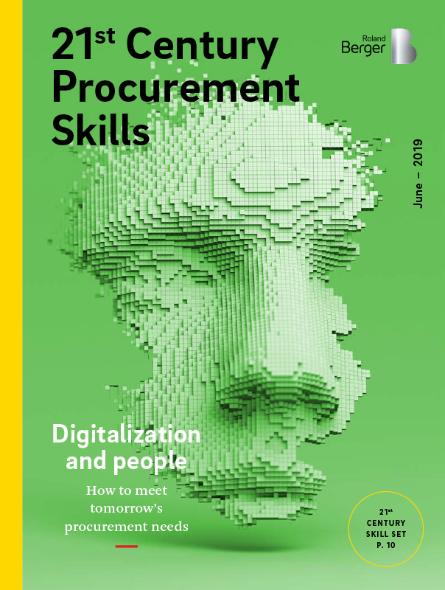How to find and develop procurement talent with the right skills
![{[downloads[language].preview]}](https://www.rolandberger.com/publications/publication_image/Roland_Berger_522_Procurement_Skills_Cover_download_preview.jpg)
Digital fluency and the ability to solve complex problems are some of the 21st century skills required to turn procurement managers into MVPs for their employers.


The dawn of the digital era, from the unveiling of the first personal computer in 1976, has brought great changes in procurement. This is ultimately driving its effectiveness, efficiency, and compliance. It is also becoming obvious that the impact of digitalization on procurement will be far more revolutionary than previous innovations, such as the first electronic catalog management solutions decades ago. Roland Berger has termed the current challenges and developments the «Procurement Endgame», as the final stage of procurement transformation has begun.

The function will take on a more entrepreneurial role and will increasingly operate as a network facilitator and innovation manager. This shift means the procurement function now has a once-in-a-lifetime opportunity to put strategy at the top of its agenda. It will need the right mix of talents with the right skills to cope with unknown challenges, apply disruptive new technologies and find creative solutions to complex problems. An increased international collaboration, insight-generation from big data, agile projects, and increasingly transparent supply chains will all shake up the workplace.
To understand and handle information and technology, staff must possess a high level of digital fluency to cope with new technological challenges. This means gaining expertise in a new meta-competency. A digitally fluent employee can assess the function and added value of disruptive technologies within certain business areas. For example, an AI call-center bot can be useful for making simple appointments as part of supplier-relationship management. But a digitally fluent person would point out the risk of decreasing supplier satisfaction for more demanding tasks, which are still beyond AI.
In the past, businesses mostly faced so-called well-defined problems – challenges that could be overcome using established methods. Digitalization has changed this, and procurement now faces an increasing number of ill-defined problems with no holistic or universal solutions. Consequently, procurement managers need to quickly adapt to this new breed of challenges. Collaborative working and the ability to solve complex problems together will be key to this. This will require digitally fluent teams with diverse skillsets, who can harness oceans of data and generate insights and creative solutions. For example, developing tailor-made digital tools for use in procurement organizations requires innovative problem-solving approaches and lots of collaborative work with start-ups and software developers. These are tasks rarely performed by procurement several years ago.
While managers are focused on the planning, control and implementation of key objectives, leaders convey the meaningfulness of change through good communication. They empower their employees to face future challenges positively and continuously develop their skills and personal responsibility. This is particularly important at a time when digitalization is disrupting jobs and tasks, making established markers such as KPIs and staff performance evaluation increasingly antiquated. Hence, it takes leadership – not management – to lead teams successfully.
To help firms play out the Procurement Endgame, we have developed a framework of the skills needed to meet its challenges, and which will make people the "most valuable players" (MVP). These skills are dependent on each other and are matched to selective procurement tasks in the Cognitive Lens:
Procurement executives must find, recruit, train and retain talents that possess the MVP skillset while simultaneously fostering an empowering culture and leadership style. To find the right talent, they should be open-minded towards establishing a diverse procurement community with employees of different backgrounds in terms of academic CV, work experience, culture and personality. The recruitment process should be tailored to identify and explore the MVP procurement skillset among candidates' profiles.
![{[downloads[language].preview]}](https://www.rolandberger.com/publications/publication_image/Roland_Berger_522_Procurement_Skills_Cover_download_preview.jpg)
Digital fluency and the ability to solve complex problems are some of the 21st century skills required to turn procurement managers into MVPs for their employers.